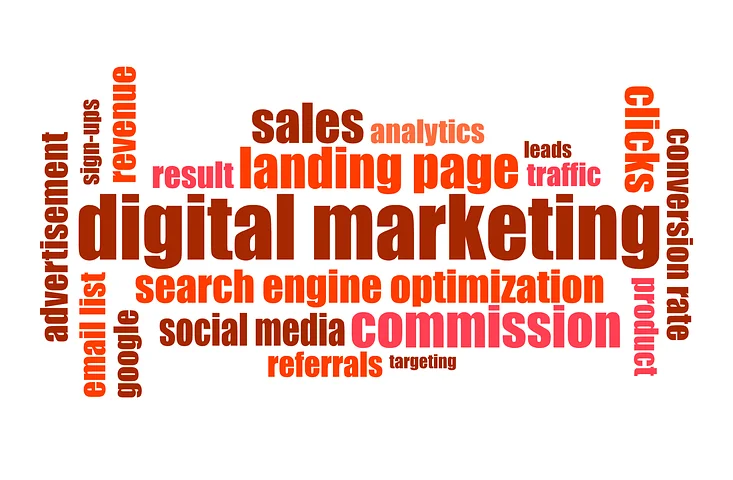Digital Marketing 101: Everything You Need to Know to Get Started
Digital marketing is one of the most effective ways to reach your target audience, build your brand, and drive sales. However, if you’re new to the world of digital marketing, it can be overwhelming to know where to start. In this article, we’ll cover everything you need to know to get started with digital marketing.

What is Digital Marketing?
Digital marketing guides the use of digital channels, such as search engines, social media platforms, websites,and email, to advertise products or services.The goal of digital marketing is to reach potential clients where they consume most of their time – online.
The Benefits of Digital Marketing
Digital marketing suggests multiple benefits over standard marketing methods.These benefits include:
Cost-effectiveness
Digital marketing campaigns are typically more affordable than traditional marketing campaigns.
Increased reach
Digital marketing permits you to get a larger audience than conventional marketing methods.
Real-time data
Digital marketing provides real-time data on campaign performance, allowing you to adjust your strategies as needed.
Targeted marketing
Digital marketing allows you to target specific audiences based on factors such as demographics, interests, and behaviors.
The Various Types of Digital Marketing
There are several types of digital marketing, each with its amazing advantages and strategies. Some of the most famous types of digital marketing include:
Search engine optimization (SEO)
SEO regards optimizing your website to rank elevated in search engine results pages (SERPs).This can contain tactics such as keyword research, link building, and on-page optimization.
Pay-per-click advertising (PPC)
PPC involves placing ads on search engine results pages or social media platforms and paying for each click on your ad. This can be an practical way to push targeted traffic to your website.
Social media marketing
Social media marketing concerns advertising your brand on social media platforms such as Twitter, Facebook , and Instagram. This can include tactics such as content creation, community management, and influencer marketing.
Content marketing
Content marketing concerns making valuable and instructive content, such as blog posts, infographics, and videos, to attract and entertain your target audience.
Email marketing
Email marketing involves sending targeted messages to your email subscribers in order to build relationships and drive sales.
Creating a Digital Marketing Strategy
To get the most out of your digital marketing efforts, it’s important to create a comprehensive digital marketing strategy. Here are some stages to get you started
Define your goals
What do you want to accomplish with your digital marketing campaign? Are you peeking to drive better website traffic, develop leads, or improve sales?
Specify your target audience
Who are you attempting to reach with your digital marketing actions? What are their interests, behaviors, and demographics?
Choose your channels
Which digital marketing channels will be most effective in reaching your target audience? Will you focus on SEO, PPC, social media, or a combination of channels?
Create your content
What types of content will you create to engage your target audience? Will you focus on blog posts, videos, or social media content?
Develop a budget
How much will you spend on your digital marketing campaign? How will you assign your budget across various channels and tactics?
Measure and adjust
How will you measure the success of your digital marketing campaign? What metrics will you utilize to follow your progress?How will you adjust your strategies as needed to improve your results?
Best Practices for Digital Marketing
Here are some best practices to keep in mind when creating your digital marketing campaign:
Focus on your target audience
Make sure all of your digital marketing efforts are focused on your target audience’s interests, behaviors, and preferences.
Use video
Video is a highly engaging format that can help you connect with your audience on a deeper level. Consider incorporating video into your digital marketing strategy through social media, YouTube, or other channels.
Use data to inform your strategies
Use real-time data to adjust your strategies and tactics as needed to improve your results.
Test and refine
Testing and refining your digital marketing strategies is key to success. This means regularly evaluating your campaigns, analyzing your data, and making adjustments as needed to optimize your results.
Use storytelling
Storytelling is a powerful way to connect with your audience on an emotional level and build brand loyalty. Use stories to communicate your brand’s values, mission, and unique selling points.
Use influencers
Influencers can help you reach new audiences and build credibility with your target audience. Consider partnering with influencers in your industry to promote your brand and products.
Create valuable content
In order to engage your target audience and build brand awareness, it’s important to create valuable and informative content that resonates with them.
Be consistent
Consistency is key to creating brand credit and confidence. Make sure that your brand messaging, voice, and visual identity are consistent across all of your digital marketing channels.
Observe your online reputation
Your online standing can have a considerable influence on your business’s victory. Regularly monitor your online reviews and social media mentions, and respond promptly to any negative feedback.
Stay up-to-date with industry trends
The world of digital marketing is constantly evolving, so it’s important to stay informed about new technologies, tactics, and trends in the industry.
Focus on building relationships
Digital marketing is about building relationships with your target audience, so it’s important to focus on creating content that builds trust and loyalty over time.
Be mobile-friendly
With more and more people accessing the internet through mobile devices, it’s important to ensure that your website and digital marketing campaigns are optimized for mobile viewing.
Be authentic
Authenticity is key to creating confidence and credibility with your mark audience. Make sure your brand voice and messaging is consistent across all of your digital marketing channels.
By incorporating these tips and best practices into your digital marketing strategy, you can improve your performance and achieve your business goals. Remember to always stay informed about new trends and technologies in the industry, and to be flexible and adaptable as you refine your strategy over time. With dedication and hard work, you can build a successful and sustainable digital marketing program that drives growth and success for your business.
Tools for Digital Marketing
There are many tools available to help you with your digital marketing efforts. Here are some popular tools to consider:
Google Analytics
Google Analytics is a free tool that provides insights into your website traffic and audience behavior. This can help you optimize your website and improve your overall digital marketing performance.
Hootsuite
Hootsuite is a social media management tool that allows you to schedule posts, monitor your social media accounts, and track your social media analytics in one place.
SEMrush
SEMrush is a comprehensive SEO tool that provides insights into keyword research, on-page optimization, link building, and more.
Mailchimp
Mailchimp is an email marketing platform that allows you to create and send targeted email campaigns to your subscribers.
Canva
Canva is a graphic design tool that allows you to create professional-looking visuals for your digital marketing campaigns, such as social media posts, infographics, and more.
Digital Marketing Challenges
While digital marketing offers many benefits, it’s not without its challenges. Here are some common challenges that businesses face when implementing a digital marketing strategy:
Lack of resources
Digital marketing requires time, money, and expertise, which can be challenging for small businesses and startups with limited resources.
Competing for attention
With so much content available online, it can be difficult to stand out and capture the attention of your target audience.
Keeping up with changes
The world of digital marketing is constantly evolving, so it can be challenging to keep up with new technologies, algorithms, and trends.
Measuring ROI
Measuring the ROI of your digital marketing campaigns can be difficult, as there are many factors to consider, such as the cost of your campaigns and the lifetime value of your customers.
Conclusion
Digital marketing is a powerful tool for reaching your target audience, building your brand, and driving sales. By understanding the different types of digital marketing, creating a comprehensive digital marketing strategy, and using the right tools and best practices, you can optimize your results and achieve your business goals. While there are challenges to overcome, the benefits of digital marketing make it a worthwhile investment for businesses of all sizes.
Remember to start with a comprehensive understanding of your target audience and their needs, and to tailor your digital marketing strategy to their preferences and behavior. Invest in high-quality content that adds value to your audience, and use social media, email marketing, SEO, and other channels to reach them where they are spending their time online. Don’t forget to track and measure your results, and to regularly evaluate and refine your strategy to optimize your performance.
By following these tips and best practices, you can create a successful digital marketing strategy that helps you achieve your business goals and stay ahead of the competition.



